Fair Margaret and Sweet William (Child 74)
Widely known and sung-. See BSM 48. and add to the references there given Tennessee (BTFLS viii 66-8), North Carolina (FSRA 2S-6), Missouri (OFS i 109-12), Ohio (BSO 34-8), Indiana (BSI 71-9), Illinois (JAFL lii 81), and Michigan (BSSM 40-2).
A. 'Lady Marget.' From the collection of Miss Edith R. Fish of White Rock. Madison county; one of the items she sent to C. Alphonso Smith in 1915 and which later came to the North Carolina collection with permission to publish. The meaning of "broughten" in stanzas 3 and 6 is not apparent.
1 Sweet William arose one morning in May
And dressed himself in blue.
'Pray tell me all about that long, long love
Betwixt Lady Marget and you.'
2 'It's I know nothing of Lady Marget,
And she knows nothing of me.
Tomorrow morning at eight o'clock
Lady Marget my bride shall see.'
3 As she was a-standing in her dower room,
A-combing back her hair,
She saw sweet William and his brown broughten bride
As they drew near to her.
4 Back she threw her ivory comb
And back she threw her hair;
Then she ran to her bed-chamber
Nevermore to appear.
5 That very same night when they were all in the bed.
When they were all in the bed asleep.
Lady Marget rose, stood all alone
At sweet William's bed feet.
6 'And how do you like your bed, sweet William,
And how do you like your sheet.
Or how do you like your brown broughten bride
That lies in your arms asleep?'
7 'Very well, very well I like my bed,
Very well I like my sheet;
Ten thousand times better I like the lady gay
That stands at my bed feet.'
8 Sweet William arose, stood all alone,
And tingled at the ring.
There's none so ready but her seven brothers all
To rise and let him in.
9 'Oh, where is Lady Marget?' he says,
'Oh, where is Lady Marget?' he cries.
'Lady Marget is the girl I always did adore.
And she stole my heart away.
10 'Is she in her dower room?
Or is she in her hall?
Or is she in her bed-chamber
Among her merry maids all ?'
11 'She is not in her bower room,[1]
Nor neither in her hall,
But she is in her cold coffin.
Her pale face towards the wall.'
12 And down he pulled the milk-white sheets,
They were made of satin so fine.
'Ten thousand times you've kissed my lips,
And now, love, I'll kiss thine.'
13 Three times he kissed her snowy white breast,
Three times he kissed her cheeks;
But when he kissed her cold clay lips
His heart was broke within.
14 'What will you have at Lady Marget's burying?
Will you have bread and wine?
Tomorrow morning at eight o'clock
The same will be had at mine.'
15 They buried Lady Marget at the church door
And buried sweet William by her.
Out of Lady Marget 's grave sprung a green, green rose
And out of sweet William's a brier.
16 They grew and grew to the top of the church.
And they could grow no higher.
And they tied a true love's knot
And lived and died together.
1. This is "dower room" in stanzas 3 and lo, "bell room" in B, "dining room" in C, "dressing room" in G ; elsewhere "bower room" as here, which seems to be the right reading.
B. 'Lady Margaret.' Reported by L. W. Anderson of Nag's Head as sung to Arnold Perry of Kitty Hawk by his father, George Perry. A fragmentary text. The "bell" of the first line may be miswritten for "ball"; if not, I cannot guess its meaning. The manuscript is written in long lines, but there seems no reason to doubt that the text is really in the ordinary ballad meter, and it is so printed here.
1 Lady Margaret sitting in a high bell room,
Combing back her yellow hair,
She spied sweet William and his brown bride
Go passing down by there.
2 Down she threw her ivory comb,
Rolled back her yellow hair.
'That's a life, that's a life that I never can endure.
In my chamber I will die.'
3 Lady Margaret was buried in the old church yard,
Sweet William in the prior.
From Lady Margaret's head grew a blood-red rose.
And from sweet William's a milk-white brier.
4 They grew to the top of the old steejily high
And could not grow any higher.
They tied themselves in a true lover's knot
For all young people to admire.
C. 'Sweet Willie.' Reported by Mrs. Sutton from the singing of Mrs. Brown of Beech Mountain, Watauga county. Not dated, but secured probably about 1920. The language is puzzling in places.
1 Sweet Willie he arose one morning in May,
He dressed himself in blue.
'Come tell unto me this whole long love
Betwixt Lillie Margret and me.'[1]
2 'I know no harm of Lillie Margret
And she knows none of me;
And on tomorrow's morn, before eight o'clock,
Lillie Margret a bride shall see.'
3 He mounted his horse, he rode with speed,
He rode till he came to the door.
There was nobody there for to let him in
But his own dear brother John.
4 'Where is Lillie Margret? Is she in her dining room?
Is she in her hall?
Or is she in her bed-chamber?
Come tell unto me I call.'
5 'She is not in her dining room,
She is at home.
For she is in her own coffin
Which sits agin the wall.'
6 'Unwrap, unwrap the winding sheet
And lay the fine linen.
That I may kiss her cold clay lips
As ofttimes she's kissed mine.'
7 The first that he kissed was her revely- cheek.
The next that he kissed was her chin.
But the last of all was her cold clay lips
That had no breath in them.
1. The opening dialogue, found in a good many texts, is between William and Margaret's father. It is clear in Child's B but becomes obscure in many traditional texts. Here "me" should of course be "you."
2. See note on this word in 'The Lass of Roch Royal' B, stanza 15, below.
D. Another version reported by Mrs. Sutton, but it does not appear from whom she got it. Only part of it is given, the rest summarized.
1. Lady Marg'ret sat at her bower window,
A-combing her golden hair ;
And there she saw sweet William's bride
As they were riding near.
2 Down she laid her ivory comb
And up she hound her hair;
She went into her bower
And never more came there.
3 'God give you joy, you lovers there,
In bride-bed fast asleep;
For I am gone to a grass-green grave,
Wrapped in my winding sheet.'
"In the verses that follow," Mrs. Sutton notes, "the groom dreamed of Lady Marg'ret's death, and asked permission of his bride to go and see her. When he reached the bower he was greeted by seven brothers":
Then up and spoke her seven brothers,
Making a bitter moan.
'Go home and kiss your nut-brown bride
And leave our sister alone.'
E. Secured by Mrs. Sutton from Myra Barnett (Mrs. J. J. Miller) of Caldwell county, one of her major sources of ballad texts and tunes. The same, stanza by stanza, as version C above except for various minor differences of language.
F. A fourth, fragmentary text obtained by Mrs. Sutton from a Mrs. Reid not further identified agrees with the first three stanzas of D above except that between the last two of those stanzas it inserts another stanza:
When day was gone and night was come
And all men fast asleep.
There came the ghost of fair Margrit
And stood at her love's feet.
G. 'Sweet William.' From the manuscript ballad collection of Miss Edith Walker of Boone, Watauga county, communicated in 1936. The first seven stanzas correspond, with some verbal variations, to the first seven of A above; after that it runs:
8 'I dreamt a dream,' Sweet William said,
'That troubles me in my head;
I dreamt my hall was full of wild swine
And Lady Margaret was dead.'
9 The night a-being gone and the day a-coming on.
Most of the people were asleep,
Sweet William asked leave of his own true love
Lady Margaret he might go see.
10. He rode till he came to Lady Margaret's gate,
He dangled at the bell;
But none so ready as her own kind brother
To rise and let him come in.
11 'Where is Lady Margaret?' he said.
'Is she in her dressing room,
Or is she in the hall, or is she in her bright chamber
Among the merry maids all?'
12 'She's not in her dressing room.
Neither in the hall;
She's a-lying in her cold cofifin
That sets again yonder s wall,'
13 'Unwind, unwind her winding sheet
That's made of Hollands so fine;[1]
Let me kiss her cold clay lips,
For I'm sure she'll never kiss mine.
14 'Today it's over Lady Margaret's grave
And tomorrow it's over mine.
I'll bid farewell to my kinfolks all;
It's all I've left behind.'
---------------------------------
20. Fair Margaret and Sweet William (Child 74) [Music]
A. 'Lady Margaret.' Sung by Mrs. Nora Hicks. Recorded at Mast's Gap, Sugar Grove, Watauga county, August 28, 1940. The first stanza was not recorded.
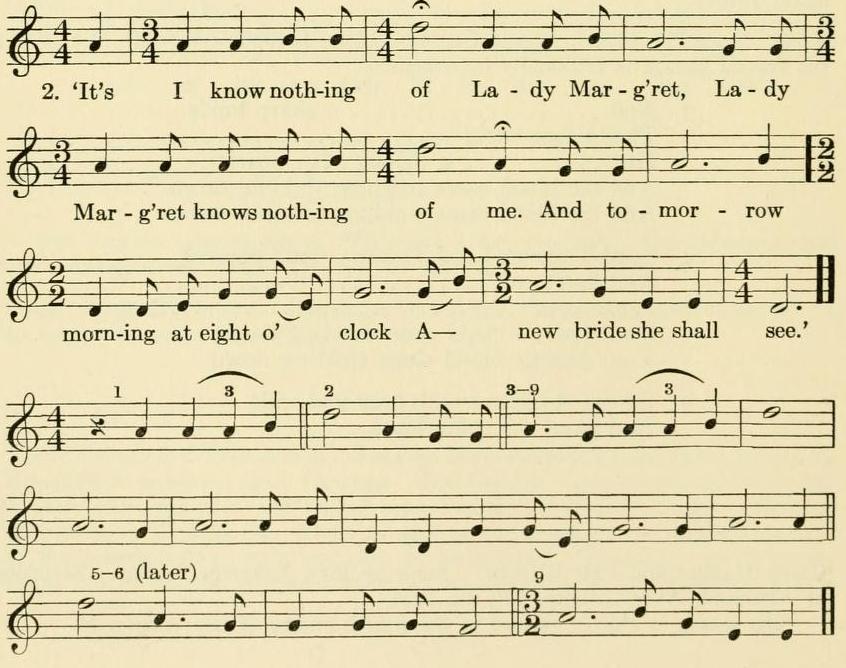
For melodic relationship cf. **SCSM 390; *SharpK i 140, No. 20H, only, however, in its most basic melodic points. Scale: Mode III, plagal. Tonal Center: g. Structure aa1bc (3.3,2,2) = ab (S, 5) ; possibly also mm1n (3,3,4) = barform. Circular Tune (V).
C. 'Sweet Willie.' Sung by Mrs. Brown. Procured by Mrs. Sutton at Beech Mountain, Watauga county. No date.
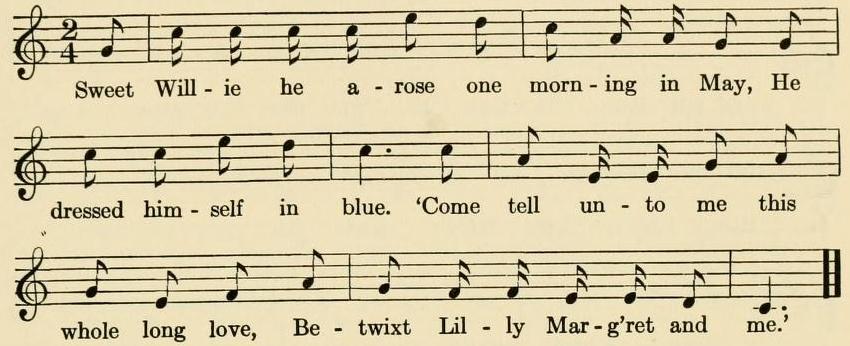
For melodic relationship cf. **SharpK i 139, No. 20E; *BBM 134. Scale: Hexachordal. Tonal Center : c. Structure : mm1n (2,2,4) = barform.
D. 'Sweet Willie.' Procured by Mrs. Maude M. Sutton. Singer, date, and place not given.
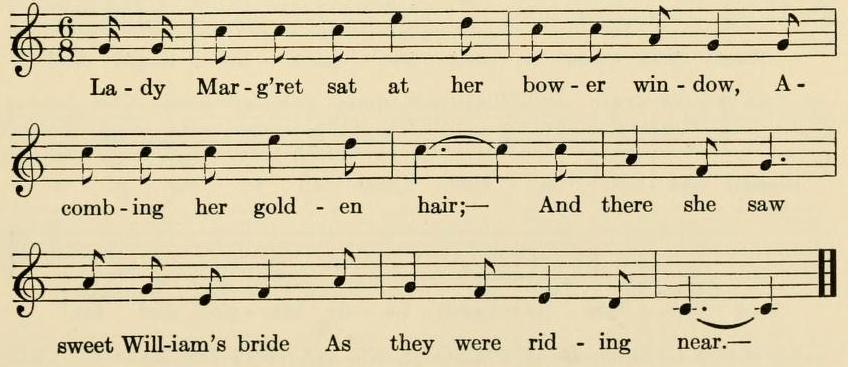
The MS score No. 2 gives the same text as that of the C version. The text used here, however, was taken from the recording of Mrs. Sutton's second version as found on cylinder 9-X. The tune is almost identical with that of her first version. Scale: Hexachordal. Tonal Center: c. Structure: mm1n (2,2,4) = barform.
H. 'Fair Margaret and Sweet William.' Sung by Mrs. L. H. Palmer. Recorded at Senia, Avery county, August 26, 1939.
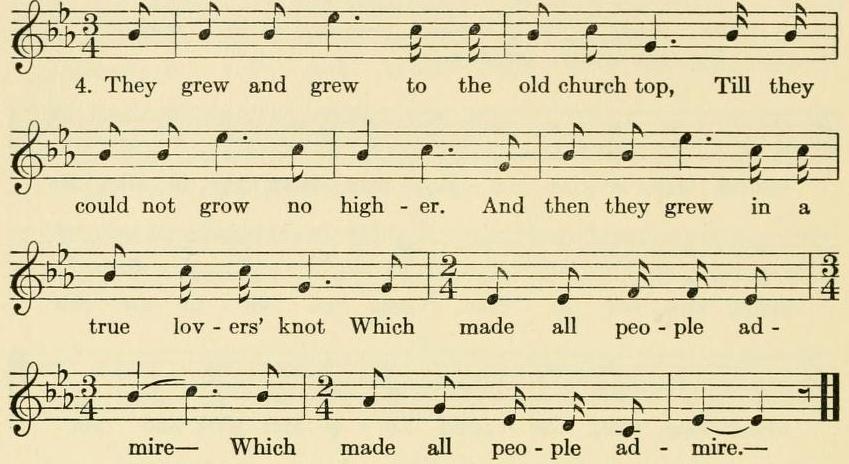
Another title given is 'Margaret and William.' The text is similar to the 20B version, stanza 4.
For melodic relationship cf. **TBV 572, No. 19K. Scale: Heptachordal, plagal. Tonal Center: e-flat. Structure: aa1a1bc (2,2,2, 2,2) ; c is rhythmically related to b.
I. 'Fair Margaret and Sweet William.' Sung by Mrs. James York. From the record of Dr. W. A. Abrams at Boone, September 14, 1941. Another title given is 'Lady Margaret and Sweet William.'
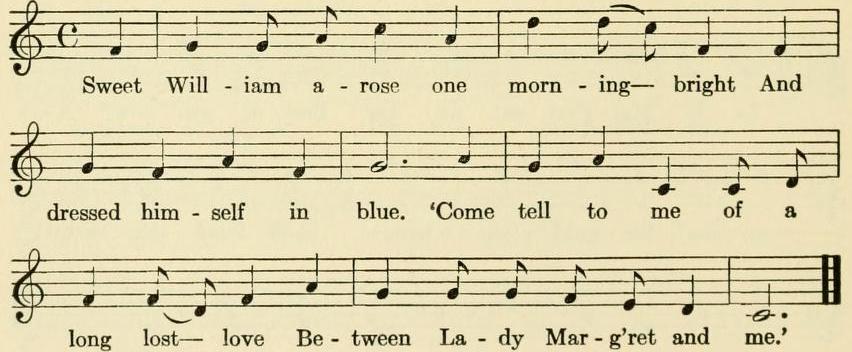
For melodic relationship cf. **BSO 34, No. 12A; FSS 523, No. iiC; TBV 572, No. 19K. Scale: Hexatonic (4), plagal (Mode III). Tonal Center: f. Structure: abcd (2,2,2,2). Circular Tune (V).